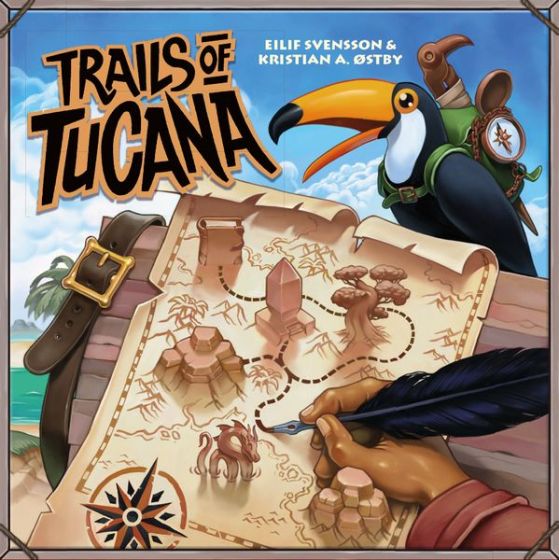Trails Of Tuscana
SKU
MATAPOTRA0010
Login / Register for prices and stock availability
-
Players: 1-8
-
Age: 10+
-
Languages: English
-
Release Date
Jul 16, 2021
Trails of Tucana is a flip-and-write game from the creators of Avenue and Doodle City that is quick and easy to play, but has enough depth to entertain gamers.
Each player is given a map of the island Tucana, showing its villages and important sights. The positions of the villages are randomized for each player, so every game will provide a unique puzzle.
Each turn, one player flips over two terrain cards. Each player must draw — on their own map — a trail between two neighboring spaces of the shown terrains. Gradually, the trails will grow into a network of roads. Players score points by connecting matching harbors, and by connecting sights to harbors. Being the first to connect a pair of harbors provides bonus points.
To add depth to the game, there are varying distribution of the different terrain cards. Mountain cards are for instance rarer than desert cards, so it would be harder to build a trail through a mountain range or over water than through desert or forest. Players need to take this into account when planning their routes. And they should maximize the probability that they will be able to make use of any combination of terrain cards that may come up.
Each player is given a map of the island Tucana, showing its villages and important sights. The positions of the villages are randomized for each player, so every game will provide a unique puzzle.
Each turn, one player flips over two terrain cards. Each player must draw — on their own map — a trail between two neighboring spaces of the shown terrains. Gradually, the trails will grow into a network of roads. Players score points by connecting matching harbors, and by connecting sights to harbors. Being the first to connect a pair of harbors provides bonus points.
To add depth to the game, there are varying distribution of the different terrain cards. Mountain cards are for instance rarer than desert cards, so it would be harder to build a trail through a mountain range or over water than through desert or forest. Players need to take this into account when planning their routes. And they should maximize the probability that they will be able to make use of any combination of terrain cards that may come up.



